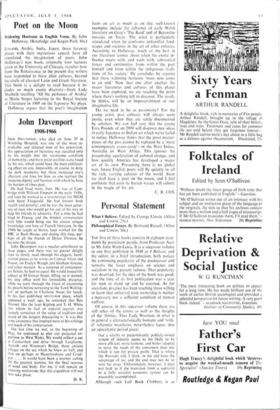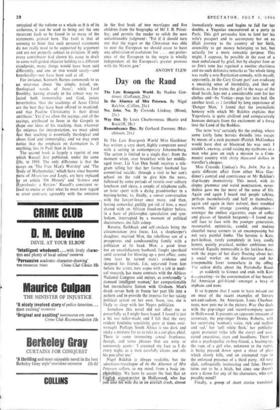Personal Statement
Philosophical Essays. By Bertrand Russell. (Allen and Unwin, 30s.) THE first of these books consists in eighteen state- ments by prominent people, from Professor Ayer to Mr John Wren-Lewis. It is a successor volume to one first published in 1940 as I Believe; and the editor, in a brief introduction, both notices the continuing popularity of the predecessor and remarks the lesser emphasis on science and socialism in the present volume. That popularity was deserved, for the idea of the book was good; and the time of its first publication was a year for men to stand up and be counted. As for socialisM, practice has been teaching those willing to learn that universal state ownership is neither a necessary nor a sufficient condition of human welfare.
Of course, in this successor volume there are still relics of the errors as well as the insights of the 'thirties. Thus Lady Wootton, in what is in general a characteristically humane and 'with- it' reformist manifesto, nevertheless lapses into an apocalyptic period piece: that a wholly or predominantly publicly-owned system of industry seems to me likely to he more efficient, more humane, and better adapted to serve the needs of the consumers than one which is run for private profit. That is where the Russians will, I think, in the end have the advantage of us; and the end may not be so very far away. Unfortunately, however, it does not look as if the transition from a capitalist to a fully socialist economic system can be peaceably accomplished.
Although such Left Book Clubbery is as
untypical of the volume as a whole as It is of its authoress, it can be used to bring out the one recurrent fault to be found in so many of the statements printed here. The fault is that of seeming to think that such personal statements do not really need to be supported by argument and are not properly subject to criticism. If only every contributor had shown his essay in draft to some well-girded objector holding to a different standpoint, many things would have been said differently, and one or two would surely—and beneficially—not have been said at all.
For instance, Kenneth Barnes commends to us an utterance about 'the simple, naked, un- theologised words of Jesus'; while Lord Boothby, having already in his robust way re- jected both immortality and God, insists nevertheless 'that the teachings of Jesus Christ are the best that have been offered to mankind; and that Pauline Christianity is their direct antithesis.' Yet if we allow the sayings, and all the Sayings, attributed to Jesus in the Gospels to shape our ideas of his teaching, then, whatever be enigmas for interpretation, we must admit that that teaching is essentially theological and about God and immortality; and we may even botice that the emphasis on damnation is, if anything, less in Paul than in Jesus.
The second book is largely a reprint of one which Russell first published, under the same title, in 1910. The only difference is that the essays on 'The Free Man's Worship' and The Study of Mathematics,' which have since become farts of Mysticism and Logic, are here replaced by an article 'On History' and 'Science and Hypothesis: a Review.' Russell's consistent re- fusal to excise or alter what he must now regard as error contrasts agreeably with the omission in the first book of two marriages and five children from the biography of Mr J. B. Priest- ley; and permits the reader to relish the now unfashionable judgment : 'Yet if it should turn out that the negro or the Chinaman was able to oust the European we should cease to have any admiration of evolution; for . . . our prefer- ence of the European to the negro is wholly independent of the European's greater prowess with the Maxim gun.'
ANTONY FLEW































 Previous page
Previous page